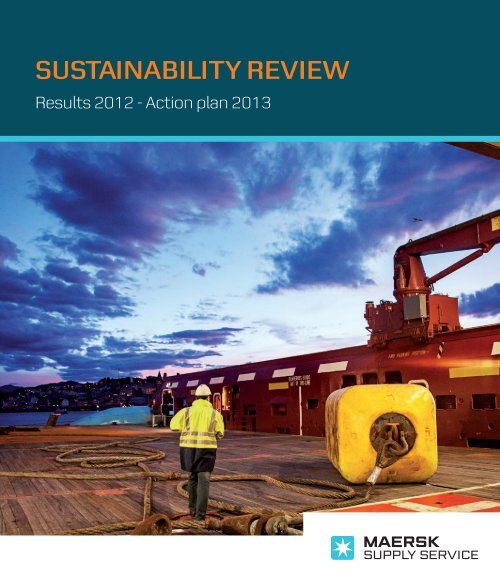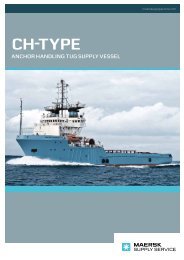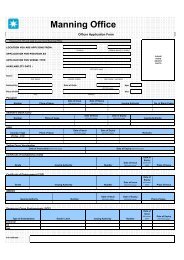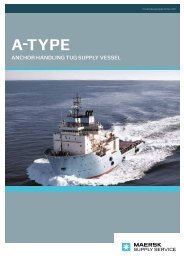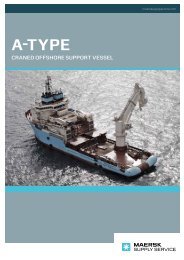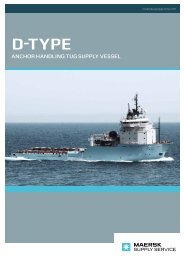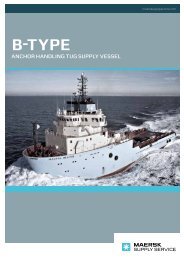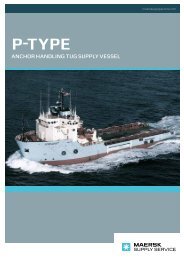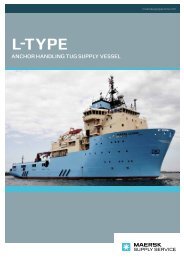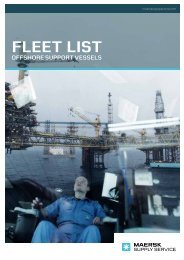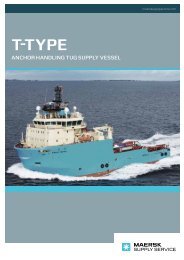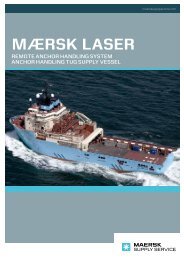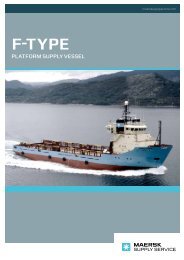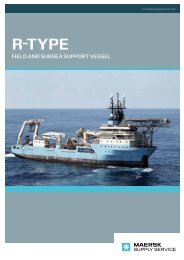SUSTAINABILITY REVIEW - Maersk Supply Service
SUSTAINABILITY REVIEW - Maersk Supply Service
SUSTAINABILITY REVIEW - Maersk Supply Service
You also want an ePaper? Increase the reach of your titles
YUMPU automatically turns print PDFs into web optimized ePapers that Google loves.
<strong>SUSTAINABILITY</strong> <strong>REVIEW</strong><br />
Results 2012 - Action plan 2013
TABLE OF<br />
CONTENTS<br />
CEO statement ............................3<br />
Our business strategy ......................4<br />
Materiality assessment .....................6<br />
Stakeholder interaction ....................8<br />
Quality Assurance ........................10<br />
HEALTH & SAFETY ........................12<br />
An integrated part of our operations ..........13<br />
A small token of appreciation ................14<br />
Extraordinary safety record ..................15<br />
ENVIRONMENT ...........................16<br />
We are dedicated to protecting the environment ..17<br />
The way we think ..........................18<br />
SOCIAL RESPONSIBILITY ..................20<br />
Focus on the benefits for our business .......21<br />
Training programme for Angolan seafarers ....22<br />
Our dedicated people ......................25<br />
RESPONSIBLE BUSINESS PRACTICES ......26<br />
Sunlight is the best disinfectant .............27<br />
Responsible procurement ..................28<br />
Performance & Targets ....................30<br />
Company Profile .........................37<br />
Abbreviations & Definitions ...............38<br />
“Only through the dedication<br />
Contact information ......................40<br />
of our employees can we reach<br />
our ambitious targets for<br />
sustainability<br />
Carsten Plougmann Andersen<br />
CEO
CEO STATEMENT<br />
3<br />
“We strive for zero personal injuries<br />
CEO STATEMENT<br />
<strong>Maersk</strong> <strong>Supply</strong> <strong>Service</strong> has the ambition to fully integrate<br />
sustainability in all business operations in 2013. In this our<br />
second sustainability review we present our steps towards<br />
fulfilling this ambition and introduce our targets for the<br />
years to come.<br />
The report shows that 2012 has been a busy and important<br />
year in our efforts to reach the ambitious targets for our four<br />
sustainable themes: Health & Safety, Environment, Social<br />
Responsibility and Responsible Business Practices. Our<br />
action plans for each theme will secure a constant follow-up<br />
up on our targets in 2013.<br />
Sustainability based on Quality Assurance<br />
As we emphasise in the review Quality Assurance (QA)<br />
secures our sustainable steps. We commit ourselves to<br />
the highest standards and use QA to ensure continuous<br />
improvements in meeting these standards. By means<br />
of certifications, audits and vettings we ensure that<br />
sustainability forms an essential part of our operation.<br />
Reviewed risk management process<br />
Our sense of responsibility is reflected in our safety culture<br />
and our contribution to provide a healthy environment for all<br />
our employees. We strive for zero personal injuries.<br />
In 2012 we have reviewed our risk management process in<br />
order to improve the risk and hazard awareness as well as to<br />
capture lessons learned in the risk management process. It<br />
enables us to prepare better risk assessments.<br />
Protecting the environment<br />
As part of our effort to protect nature, we are very<br />
dedicated to prevent oil spills and reduce fuel consumption.<br />
Our targeted Health & Safety and Environment (HSE)<br />
inspections of the vessels identify risk of safety incidents<br />
and environmental spills. We train our crews and implement<br />
periodic drills. We benchmark our vessels to ensure that<br />
they operate with a minimum consumption of fuel, and<br />
in 2012 we initiated the construction of two new and<br />
innovative offshore vessels with a state of the art standard<br />
for emission levels.<br />
CSR governance structure<br />
Further, in 2012 we expanded our work with sustainability<br />
by making Corporate Social Responsibility (CSR) an even<br />
more integrated part of the daily business. We are in the<br />
process of establishing a CSR governance structure in<br />
the organisation and are systematising our CSR related<br />
activities. To ensure a closer integration of CSR, we involve<br />
our employees at local basis in developing their own CSR<br />
action plans.<br />
Zero tolerance for bribery<br />
Due to the increased focus on CSR, Responsible Business<br />
Practice has become a more integrated part of our<br />
sustainability work. We focus on anti-corruption and<br />
responsible procurement. We expanded our anti-corruption<br />
programme in 2012 and adhere to a zero tolerance policy<br />
for bribery. We focus on strategic suppliers and prioritise<br />
our efforts in areas where the impact on our sustainability<br />
performance is most beneficial.<br />
The way we think<br />
Engaged employees are essential to our ability to remain a<br />
business success and to continue our ability to perform. The<br />
result of our employee engagement survey in 2012 proves<br />
high participation and engagement, which is very positive.<br />
Only through the dedication of our employees can we reach<br />
our ambitious targets for sustainability.<br />
Carsten Plougmann Andersen<br />
CEO
4<br />
// OUR BUSINESS STRATEGY<br />
<strong>SUSTAINABILITY</strong><br />
AN INTEGRATED PART OF OUR BUSINESS STRATEGY<br />
In 2010 we started to work strategically with<br />
sustainability as an integrated part of our business<br />
strategy.<br />
Our work with sustainability is covered by the areas HSE<br />
and CSR.<br />
Our focus on Health & Safety and Environment, which<br />
gives us our licence to operate, started even before and<br />
we have worked systematically with these topics for<br />
many years.<br />
In recent years we have broadened our scope so today<br />
social responsibility and responsible business practices<br />
are equally important topics on the sustainability<br />
agenda for <strong>Maersk</strong> <strong>Supply</strong> <strong>Service</strong>.<br />
Sustainability<br />
HSE<br />
- Health & Safety<br />
- Environment<br />
CSR<br />
- Social Responsibility<br />
- Responsible Business Practices
5<br />
2013 integration<br />
The A.P. Moller - <strong>Maersk</strong> Group has an overall goal to<br />
integrate sustainability in all of its business operations by<br />
2013 with the ultimate purpose of turning sustainability<br />
into a long-term competitive advantage.<br />
Since the fourth quarter of 2011 we have been reporting<br />
on our integration progress to the A.P. Moller - <strong>Maersk</strong><br />
Group Sustainability Council. During 2012 we have<br />
worked on reaching the goals set by the Group. We are<br />
thus well on track fulfilling the ambitions of the Group<br />
to fully integrate sustainability in 2013 and use it as a<br />
business differentiator.<br />
<strong>SUSTAINABILITY</strong><br />
Our work with Corporate Social Responsibility<br />
(CSR) includes Health & Safety, Environment, Social<br />
Responsibility and Responsible Business Practices.<br />
Our Corporate Social Responsibility (CSR) strategy is<br />
based on impact studies, materiality assessments, risk/<br />
opportunity mapping and our overall business strategy.<br />
Our CSR strategy is furthermore closely linked to our<br />
values, our policy statement and our membership of the<br />
UN Global Compact.<br />
HEALTH & SAFETY<br />
ENVIRONMENT<br />
SOCIAL<br />
RESPONSIBILITY<br />
RESPONSIBLE<br />
BUSINESS<br />
PRACTICES<br />
We work with sustainability as an integrated part of our<br />
safety management system. By means of certifications,<br />
audits and vettings we ensure that all procedures are<br />
followed and the risk potential is minimised. In 2013<br />
we follow up on our targets and standards to assure<br />
continual improvements.<br />
Our sustainability depends on the skills, commitment<br />
and behaviour of our employees. Attracting and retaining<br />
the right people is essential for reaching our goals for<br />
sustainability. In 2012 we have started implementing a<br />
Vessel Empowerment programme which aims to add<br />
more meaningfulness and personal growth into the<br />
everyday work life of our offshore employees.<br />
OUR PRIORITIES FOR CSR<br />
Our priorities for social responsibility include<br />
labour rights, human rights, diversity, disaster<br />
response and community involvement.<br />
Our work to promote responsible business<br />
practices focuses on anti-corruption and<br />
responsible procurement.
Occupa<br />
hea<br />
Drug and<br />
alcohol polic<br />
6<br />
MATERIALITY<br />
ASSESSMENT<br />
When we first set the course for a strategy on CSR we went<br />
through an internal process to identify our stakeholders<br />
and prioritise them according to how they influence on<br />
our business. Thus, our sustainability work is based on a<br />
thorough analysis of the risks and opportunities for our<br />
business. The issues illustrated in the figure below were<br />
selected internally. It is our goal to involve our stakeholders<br />
in our materiality assessment in the coming years. Our<br />
surroundings keep changing, and so do our stakeholders’<br />
views and influence on our company.<br />
Focus on safety<br />
It was no surprise to us that our materiality assessment<br />
pointed at safety as the most important topic, as it has high<br />
significance for most of our stakeholders and high influence<br />
on our business success. Other important issues for our<br />
Safety
MATERIALITY ASSESSMENT<br />
7<br />
stakeholders and us are environment, anti-corruption,<br />
health, human rights, responsible procurement and local<br />
engagement.<br />
As our materiality assessment underlines the importance<br />
of the issues for our business, all topics are included in this<br />
report and we have set up targets for their integration in our<br />
daily operation.<br />
tional<br />
lth<br />
Discrimination<br />
& equal<br />
opportunity<br />
Crisis<br />
management<br />
Anticorruption<br />
<strong>Supply</strong> chain<br />
Climate<br />
Human rights<br />
& labour rights<br />
Environment<br />
y<br />
Local<br />
community
8<br />
// STAKEHOLDER INTERACTION<br />
STAKEHOLDER<br />
INTERACTION<br />
Dialogue with our stakeholders is a key part of our<br />
sustainability effort, and we continue to experience<br />
that it is through close relations to our surroundings<br />
that we achieve the best results. Therefore, we are<br />
constantly working on methods and initiatives to<br />
keep improving our relationship with our<br />
stakeholders.<br />
COMMUNITIES<br />
Community involvement and<br />
investment enhance our reputation<br />
and make our employees proud<br />
In the dialogue with our stakeholders we listen<br />
to everybody no matter what their level of<br />
influence is on our business.<br />
EMPLOYEES<br />
Our employees are essential for<br />
meeting our obligations to all<br />
other stakeholders and their<br />
engagement is crucial for our<br />
strategy and growth<br />
CUSTOMERS<br />
Our customers are increasingly focused<br />
on sustainability and responsible<br />
business practices. Therefore, we are<br />
dedicated to working together<br />
to improve the sustainability<br />
of our activities by sharing<br />
best practice<br />
A.P. MOLLER - MAERSK<br />
GROUP<br />
In cooperation with the Group we set<br />
guidelines and conditions for our<br />
business practices at both<br />
strategic and operational<br />
level
9<br />
AUTHORITIES<br />
Close contact with local and<br />
central governments is important<br />
to ensure mutual trust<br />
NGOs<br />
NGOs raise awareness of all<br />
sustainable issues, and we find<br />
it important to listen to<br />
their views<br />
BUSINESS<br />
ASSOCIATIONS<br />
Our membership of branch<br />
organisations helps us to be best in<br />
class on upcoming regulations<br />
and trends<br />
LABOUR UNIONS<br />
Labour unions influence our<br />
employee relations and help us with<br />
valuable knowledge. We have a<br />
common interest in securing safe<br />
and sustainable workplaces<br />
SUPPLIERS & PARTNERS<br />
Close relationships with our<br />
suppliers, partners and distributors<br />
are crucial for our sustainable<br />
business, and we want them to<br />
cooperate in the most<br />
responsible way<br />
MEDIA<br />
A good on-going relationship<br />
with the media is important for<br />
the sustainable profile of <strong>Maersk</strong><br />
<strong>Supply</strong> <strong>Service</strong>. Therefore we have<br />
an open attitude towards media<br />
and aim at servicing the<br />
press in a thorough and<br />
professional manner
12 10<br />
“Quality Assurance is the<br />
base for our sustainability
QUALITY ASSURANCE<br />
11<br />
QUALITY<br />
ASSURANCE<br />
Quality Assurance has become the base for our<br />
progress on sustainability. It ensures continuous<br />
focus on our customer’s needs.<br />
By means of certifications, audits and vettings we meet our<br />
own requirements and the demands of our customers. We<br />
make sure that procedures are followed and that the risk<br />
potential is minimised. Wherever in the world we operate,<br />
we follow high standards to ensure efficient and sustainable<br />
operation.<br />
Vettings<br />
To meet the high standards set by our customers regarding<br />
safety, quality and the environment, our vessels in general<br />
are subject to a wide range of in-depth assessments of<br />
quality and suitability before the tasks. As part of the<br />
offshore business we have adopted Offshore Vessel<br />
Management and Self Assessment (OVMSA) published<br />
by Oil Companies International Marine Forum (OCIMF). In<br />
OVMSA we self-assess our safety management system<br />
against more than 300 key performance indicators (KPIs)<br />
and industry best practice guidance listed in the twelve<br />
elements; from crew management and supply operation to<br />
safety inspections and environment.<br />
The result of the self-assessment will be used to develop<br />
continuous improvement plans for operational safety and<br />
environmental performance securing the highest standards<br />
of ship management and operational excellence.<br />
Our internal inspection regime – <strong>Maersk</strong> Offshore Vessel<br />
Inspection Questionnaire (MOVIQ) – is based on the<br />
Offshore Vessel Inspection Questionnaire (OVIQ) published<br />
by OCIMF. The OVIQ consists of more than 600 questions in<br />
15 chapters covering all areas of the vessels ranging from<br />
construction to certification and operation. By using the<br />
OVIQ we want to achieve a high standard of our vessels,<br />
increased safety of our operation and reduce the number of<br />
findings in external inspections.<br />
In 2013 we will tighten up on our targets and standards with<br />
new initiatives and KPIs.<br />
Our Fleet Auditors<br />
To conduct inspections and audits of our vessels and offices<br />
we have established an internal team of fleet auditors.<br />
In addition to the MOVIQ vessel inspections the auditors<br />
perform internal audits of vessels according to the<br />
International Safety Management (ISM) Code, which is the<br />
international standard for safe management and operation<br />
of our vessels. According to the code all vessels are to be<br />
audited at least once a year. Additionally the auditors handle<br />
audits in connection with our environmental management<br />
system ISO 14001.<br />
Henrik B. Carstensen is one of our fleet auditors. He says:<br />
“As fleet auditors we ensure that the ships and the offices<br />
function in the best possible way in terms of technical<br />
operations, employee safety and environmental aspects.<br />
We coach and support in HSE matters, and in addition<br />
to the inspections and audits we assist in investigating<br />
accidents to personnel and other types of incidents and<br />
servicing of safety equipment such as inflatable vests and<br />
multigas detectors. Furthermore, we assist the site team<br />
and vessel management in managing Health & Safety and<br />
Environmental matters during conversions and upgrades of<br />
vessels.”
12<br />
“Toolbox talks are mandatory<br />
before performing any task
13<br />
HEALTH & SAFETY<br />
AN INTEGRATED PART<br />
OF OUR OPERATIONS<br />
Safety is paramount for <strong>Maersk</strong> <strong>Supply</strong> <strong>Service</strong> and<br />
an integrated part of our operations and how we do<br />
business. Our goal is zero incidents, and we strive<br />
to lead the industry in managing and mitigating the<br />
hazards of offshore marine work.<br />
Safe Job Analysis (SJA) and from office side include<br />
minimum requirements for safeguards/barriers. As part of<br />
the changed system, toolbox talks are mandatory before<br />
performing any task. A toolbox talk is a walk-through of risk<br />
mitigating actions including evaluation of safety risks.<br />
Safety is the most critical item on our sustainability agenda<br />
because it is essential to maintain our licence to operate.<br />
Our sense of responsibility is reflected in our safety<br />
culture, which is built up by employees at all levels – from<br />
senior management to new cadets. High standards of<br />
safety underpin employee wellbeing and reduce the risk<br />
of accidents, costs of employee absenteeism as well as<br />
business interruptions and delays, while helping to attract<br />
and retain the best people.<br />
Our customers expect rigorous safety procedures and they<br />
assess safety performance when selecting their supply<br />
vessel provider. Therefore we are constantly scrutinising<br />
how we can take safety to an even higher level.<br />
Individual responsibility<br />
We believe in the power of individual responsibility. Our<br />
crew members are expected to do anything within their<br />
power to prevent incidents and accidents i.e. exercise their<br />
Stop Work Authority in potential unsafe situations.<br />
We give our employees the opportunity to learn more<br />
about safety. In 2012 we launched a new leadership course<br />
including safety for all captains and we offer e-learning<br />
modules regarding risk management on our vessels.<br />
Strengthening our risk management process<br />
In 2012 we reviewed the management process for our risk<br />
analysis. This enables us to strengthen our procedures.<br />
With the new system we are implementing an improved<br />
way of doing risk assessments, where we can do better<br />
PHYSICAL INITIATIVE<br />
We strive to provide a healthy work environment for all<br />
our employees both onshore and offshore.<br />
As it is important with exercise and proper food for our<br />
seafarers we have launched a voluntary programme<br />
to help them reduce obesity, fatigue and sickness,<br />
and to improve endurance, fitness and general health.<br />
The health programme, “Physical Initiative” has been<br />
running globally since 2009. It provides a personal<br />
programme for each seafarer with one-on-one counselling<br />
to help meet the goals, and the seafarers can<br />
report their results anonymously as <strong>Maersk</strong> <strong>Supply</strong><br />
<strong>Service</strong> only receives overall statistics. The Physical<br />
Initiative pays each vessel a visit every third year.<br />
The interest for the programme has been increasing<br />
ever since the launch, and in 2012 the programme<br />
covered approximately a third of our vessels. Due to<br />
the interest and the obvious benefits for the crews it<br />
has been decided to expand the programme to cover<br />
100% of our vessels operations in Brazil in 2013.<br />
Furthermore we have signed a three-year contract<br />
with a Canadian company to help counsel the crew on<br />
our vessels operations in Canada. We will continue the<br />
effort in 2013.
14<br />
HEALTH & SAFETY<br />
A SMALL TOKEN OF<br />
APPRECIATION<br />
<strong>Maersk</strong> <strong>Supply</strong> <strong>Service</strong> is committed to employee safety,<br />
and we have implemented several programmes to support<br />
good safety performance on our vessels.<br />
Part of the strategy for 2012 was to recognise vessels<br />
that achieve two years Total Reportable Cases (TRC) free<br />
performance or more with a small token of appreciation for<br />
the entire crew assigned to the vessel. Due to the frequent<br />
change of crew members the price is deliberately not big<br />
and flashy, but is intended as a reward and a visible sign<br />
of recognition to the vessel for good safety performance<br />
during the period.<br />
A polo shirt for the crew is thus the prize of 2 years TRC free<br />
performance. 3 years TRC free performance give a polo<br />
shirt and a cap, while 4 years or more are rewarded with an<br />
additional backpack along with the polo shirt and the cap.<br />
As part of our CSR strategy, we also have a programme<br />
that rewards vessels with 5 or more Lost Time Injury (LTI)<br />
free years. The acknowledgment consists of an earmarked<br />
donation from 1,000 to 15,000 US dollars, which the<br />
current management and crew of the rewarded<br />
vessel donate to a charitable purpose of its own<br />
choice e.g. a local organisation.<br />
SAFETY<br />
LADDER >><br />
Pathological<br />
Who cares as long<br />
as we’re not caught<br />
Reactive<br />
Safety is important,<br />
we do a lot every time<br />
we have an accident<br />
Calculative<br />
We have systems in<br />
place to manage all<br />
hazards<br />
Proactive<br />
We work on the<br />
problems that we<br />
still find<br />
Generative<br />
Safety is how we<br />
do business here<br />
“Working with safety is a never<br />
ending effort in maintaining our<br />
license to operate
15<br />
EXTRAORDINARY<br />
SAFETY RECORD<br />
Sixteen years without any crew member being forced to<br />
take a full day off due to a LTI is an accomplishment that<br />
impresses Captain Dave Brindley.<br />
With just a few weeks onboard the <strong>Maersk</strong> Mariner,<br />
the experienced Dave Brindley, who recently took over<br />
command of the vessel, is quick to pass on any credit for<br />
the extraordinary safety record to the crew and the masters<br />
who came before him.<br />
“It is easy enough to paint a house to make it look good, but<br />
keeping it looking good is very difficult. Similarly, it is much<br />
easier to take measures to heighten the safety of a vessel,<br />
than to maintain that level of safety which <strong>Maersk</strong> Mariner<br />
has actually done over such a long period of time. It is a<br />
remarkable and inspiring achievement,” he says.<br />
Managing Director of <strong>Maersk</strong> <strong>Supply</strong> <strong>Service</strong> (Brazil) Viggo Andersen<br />
(red shirt) with members of the crew of <strong>Maersk</strong> Mariner from left to<br />
right: Amilson Pacheco, Captain Glyn Whitehead and Antonie Mello.<br />
Confidence builds safety<br />
Such a culture of maintained safety needs to be built on the<br />
foundation of confidence at all levels of command, Dave<br />
Brindley explains:<br />
“The crew needs to have the confidence to call out anybody<br />
on safety violation, including their superior officers. Everyone<br />
is responsible for their own and everybody else’s safety at<br />
all times. Likewise, a vessel’s management needs to have<br />
confidence that the company will stand by their decisions, if<br />
they choose to stop work due to a potential safety risk.”<br />
An investment in the future<br />
Last year, in honour of their 15 years without an LTI, the<br />
<strong>Maersk</strong> Mariner was awarded with 15,000 US dollars from<br />
the company to be given to a charity of their choosing. They<br />
chose a Brazilian charity named Centro de Transformacão<br />
Humana, which helps children from low income families<br />
with tutoring, sports and after school activities.<br />
Captain Glyn Whitehead hands a donation to Josiane Carvahal<br />
from Centro de Transformacão Humana.<br />
www.ceth7.org
16<br />
RECYCLING INITIATIVE IN ST. JOHN’S<br />
Segregating and recycling garbage offshore is important<br />
to reduce a vessel’s environmental footprint. Without<br />
the proper facilities to sort the garbage once the vessel<br />
reaches port the effort is meaningless. So when<br />
proactive crewmembers onboard the <strong>Maersk</strong> Detector<br />
informed management that they had nowhere to land<br />
their segregated garbage in St John’s, actions were<br />
taken to have three containers established. HSE Area<br />
Manager in Canada Jeffrey Penton (see photo) says:<br />
them bright blue and now the crews have a place to dispose<br />
of their garbage for proper recycling. To date, this<br />
environmental initiative has proven extremely effective<br />
and efficient.”<br />
“The marine base was not going to act on the matter, so<br />
I approached our management with a proposition and<br />
was permitted to establish the facilities on our behalf.<br />
We had three recycling containers procured, painted
17<br />
ENVIRONMENT<br />
WE ARE DEDICATED TO PROTECTING<br />
THE ENVIRONMENT<br />
We place high priority on environmental<br />
considerations when managing our business, and<br />
we are dedicated to protecting the environment.<br />
We take pride in living up to our environmental<br />
responsibilities and even exceeding local<br />
environmental requirements.<br />
Operating at sea with nature around us all the time makes<br />
us fully aware of our shared commitment to preserving<br />
the environment. Climate and environmental issues are<br />
important determining factors for our customers in all<br />
areas of our operation. We are expected to take care of the<br />
environment and reduce our energy consumption when we<br />
operate on their behalf. This we already do, and we are in<br />
constant dialogue with our stakeholders to make sure we<br />
stay up-to-date with their demands and expectations.<br />
Preventing spills<br />
As part of our effort to protect nature, we are very dedicated<br />
to prevent oil spills. An example is our targeted Health &<br />
Safety and Environment (HSE) inspections of the vessels<br />
identifying wear and tear, risk of safety incidents and<br />
environmental spills by inspections of e.g. hoses at hydraulic<br />
cranes and safe chemical storage.<br />
As liquid transfers to and from offshore installations can<br />
pose a risk of spills we have uniform procedures for planning<br />
these tasks including risk assessment and toolbox talks<br />
plus check of third party equipment. We have effective<br />
contingency plans including rapid response capabilities.<br />
Thus we report all spills and do lessons learned plus<br />
corrective actions to prevent incidents to reoccur. We train<br />
our crews and implement periodic drills offshore.<br />
Lowering fuel consumption<br />
Reducing fuel consumption is high on the agenda for both<br />
our customers and us. This applies to the way we use<br />
resources and maintain our equipment. We benchmark our<br />
vessels to ensure that they operate with the lowest possible<br />
fuel consumption by reducing transit speed, minimising<br />
hotel load and operate on minimum safe number of<br />
engines. Through our vessel performance system we<br />
receive detailed reports for our vessel’s fuel consumption<br />
in different operational modes and can compare them to<br />
identify best practises to the benefit of our environment and<br />
our clients.<br />
New standards for energy consumption<br />
In 2012, we initiated the building of two new offshore<br />
vessels at Chilean shipyard Asenav. The vessels<br />
are designed for operation in ultra-harsh environment<br />
offshore Canada. They will set a new standard for emission<br />
levels with expected reduced energy consumption by up to<br />
25% compared to conventional offshore support vessels.<br />
Environmental training<br />
A way to strengthen our environmental performance is to<br />
provide our employees with opportunities to learn even<br />
more in this area. During 2012, we launched a new training<br />
programme with focus on energy efficiency, environmental<br />
compliance and operational tasks related to the<br />
environment. The training is mandatory for officers, cadets<br />
and office personnel.<br />
“We are fully aware of our<br />
shared commitment to<br />
preserving the environment
18<br />
ENVIRONMENT<br />
THE WAY<br />
WE THINK<br />
Even minor reductions in daily fuel consumption<br />
can have a big influence on the environment<br />
and our bottom line. By untraditional thinking<br />
the crew of <strong>Maersk</strong> Logger found a way to save<br />
the environment significant emissions and the<br />
charterer a lot of money.<br />
hours of dodging have given our charterer a considerable<br />
cost saving and reduced operating costs. Therefore <strong>Maersk</strong><br />
<strong>Supply</strong> <strong>Service</strong> considers recommending drifting as a<br />
general procedure on all vessels when the local conditions<br />
and thorough risk management procedures allow it.”<br />
Drifting or dodging? The difference in energy consumption<br />
for <strong>Maersk</strong> Logger was significant when the captain of the<br />
vessel, Preben Hall, and his crew chose to power down and<br />
drift, when the vessel was on stand-by duties just north of<br />
the Equator in spring 2012.<br />
Traditionally, vessels on stand-by duties would be dodging<br />
– sailing around – waiting for instructions in a safe distance<br />
from the rig. But dodging can be wasteful, and as an<br />
employee in <strong>Maersk</strong> <strong>Supply</strong> <strong>Service</strong>, Captain Preben Hall<br />
is used to smart planning of all operations, constantly<br />
taking the environment and the needs of the charterer into<br />
consideration. He says:<br />
“The fuel consumption in the deep water offshore industry<br />
is often directly related to the way we think. So by thinking<br />
out of the box the idea arose to let <strong>Maersk</strong> Logger power<br />
down when the local conditions allowed this and only<br />
have the auxiliary engine running during stand-by hours.<br />
Of course, we asked our charterer for permission and they<br />
agreed to our initiative.”<br />
“The initiative obviously required thorough risk<br />
management with assessment of hazards such as weather,<br />
area, security plus distance from rig and other vessels.<br />
We had prepared Work Scope Authorisation, and all crew<br />
onboard were introduced to the plan and trained during<br />
safety meetings and daily routines.”<br />
“Our idea and implementation has been very well received<br />
both by management and our customers. The reduced<br />
Captain Preben Hall: “The fuel consumption is often directly related<br />
to the way we think.”<br />
A BOOST TO MOTIVATION<br />
Besides saving fuel of up to 300 litres of diesel oil<br />
per hour the main advantages of turning down the<br />
power include fewer emissions, cutback on lubes<br />
consumption, and reduction of noise levels for engine<br />
personnel plus saved long-term maintenance. Another<br />
added bonus is the boost to the motivation and<br />
commitment which the crew gets in the daily work,<br />
when they experience the benefits we obtain by power<br />
down and drift.
19<br />
FUEL METERS MAXIMISE SAVINGS<br />
ENVIRONMENTALLY FRIENDLY DETERGENTS<br />
As part of our efforts to reduce the amount of<br />
potential environmentally harmful chemicals in our<br />
processes we have in 2012 launched a pilot project<br />
to help us find environmentally desirable products for<br />
cleaning the interior of our vessels.<br />
The project is implemented in cooperation with three<br />
selected suppliers. Their offers and solutions, all<br />
including volume reducing dosing applications, are<br />
currently being tested as a basis for the selection of a<br />
new shortened and simplified range of detergents in<br />
2013.<br />
In 2012 we have tested our Real Time Fuel<br />
Consumption System (RTFC) as part of our focus on<br />
fuel reduction. It consists of ultra precise fuel meters,<br />
which are sending real time data to various displays<br />
in the engine room and on the bridge stations of the<br />
vessel to monitor the fuel consumption on a daily<br />
basis in cooperation with our customers.<br />
The RTFC system has been commissioned onboard<br />
our Canadian vessels <strong>Maersk</strong> Norseman and <strong>Maersk</strong><br />
Nascopie. Captain Jerome Baker evaluates that the<br />
system is another step forward increasing our fuel<br />
savings. He says:<br />
“ The RTFC system seems to be working well. It gives<br />
an instant feedback on fuel usage, which raises<br />
awareness of how much fuel we use and helps us<br />
being conscious of using our equipment to maximise<br />
savings”.
21<br />
SOCIAL RESPONSIBILITY<br />
FOCUS ON THE BENEFITS<br />
FOR OUR BUSINESS<br />
Health & Safety and Environment have been top<br />
priorities at <strong>Maersk</strong> <strong>Supply</strong> <strong>Service</strong> for long. In<br />
2011 we expanded our effort to include other<br />
sustainability related issues under the headlines<br />
Social Responsibility and Responsible Business<br />
Practices.<br />
In 2011 we published our first sustainability review,<br />
and during 2012 we have been working on reaching our<br />
ambitious targets. As an example we have added more<br />
resources by employing an Intern from the Technical<br />
University of Denmark (DTU) to enable us to fulfil our goals.<br />
Systematising and implementing<br />
In 2013 we will continue our efforts to make social<br />
responsibility an even more integrated part of our daily<br />
business. Our ambition is to focus more on the benefits<br />
of social responsibility for the employees, the societies<br />
in which we operate and our business. We are currently<br />
systematising our processes of implementation.<br />
In connection with this a new tool has been introduced and<br />
tested by our employees during a workshop in Brazil. The<br />
purpose of the tool is to involve our employees at the local<br />
offices in developing their own CSR action plan in addition<br />
to their existing HSE action plans. We are processing the<br />
results from this pilot-project, preparing to roll out the tool in<br />
all of our offices globally.<br />
As part of that process we will establish a CSR governance<br />
structure in the organisation similar to the one as we already<br />
have on Health & Safety and Environment.<br />
THE PERFECT MATCH<br />
On 1 September 2012, Anne Mette Brasen joined<br />
<strong>Maersk</strong> <strong>Supply</strong> <strong>Service</strong> as a intern for one year. She<br />
is studying Design and Innovation with focus on<br />
sustainable development on DTU. Her employment<br />
is a cooperation between <strong>Maersk</strong> <strong>Supply</strong> <strong>Service</strong> and<br />
DTU, which gives her the opportunity to combine<br />
the theory from her study with three to four weekly<br />
days of practice at <strong>Maersk</strong> <strong>Supply</strong> <strong>Service</strong>. At the<br />
same time, <strong>Maersk</strong> <strong>Supply</strong> <strong>Service</strong> gets new inputs<br />
from the university cooperation consisting of new<br />
trends and a more strategic oriented approach.<br />
Anne Mette Brasen says:<br />
“My task is to strengthen the internal work and<br />
processes regarding social responsibility and<br />
raise awareness of the theme among staff. I will<br />
help to develop and implement strategies for<br />
the continued work, and work with research, idea<br />
generation, conceptualisation and implementation<br />
of final solutions<br />
focusing on a closer<br />
integration of CSR.<br />
The internship is<br />
a perfect match<br />
between my<br />
theoretical skills<br />
and <strong>Maersk</strong> <strong>Supply</strong><br />
<strong>Service</strong>’s ambition<br />
to systematise and<br />
develop the work<br />
with sustainability.”
22<br />
SOCIAL RESPONSIBILITY<br />
TRAINING PROGRAMME FOR<br />
ANGOLAN SEAFARERS<br />
In 2012 <strong>Maersk</strong> <strong>Supply</strong> <strong>Service</strong> launched a new<br />
seafaring programme for Angolans that contributes<br />
to building capacity in the Angolan offshore<br />
industry.<br />
24 young Angolan recruits are currently enrolled in <strong>Maersk</strong><br />
<strong>Supply</strong> <strong>Service</strong>’s General Purpose Seafarers training<br />
programme at the Maritime Foundation in Chennai, India.<br />
This initiative was launched in the first half of 2012 as the<br />
first phase of an extensive training initiative for Angolan<br />
national seafarers. The programme includes one year of<br />
training in English and basic seaman skills followed by<br />
an onboard programme to sail on our ships in Angola as<br />
trainees. When the training is finished the graduates will<br />
fulfil international requirements and achieve full STCW<br />
(Standards for Training, Certification and Watchkeeping)<br />
Certification. The next class of trainees is expected to<br />
commence their training in 2013.<br />
The group will spearhead our ambitious training initiative<br />
aimed at building up a pool of local seafarers in oil rich<br />
Angola, which is an important growth market. A new<br />
programme for bridge and engine room cadets is also<br />
under development and furthermore, we are exploring the<br />
opportunities for developing a training programme for galley<br />
staff.<br />
Creating shared value through training<br />
The initiative is a prerequisite from the Angolan authorities<br />
for doing business in the country, but building capacity in<br />
the Angolan offshore industry also benefits <strong>Maersk</strong> <strong>Supply</strong><br />
<strong>Service</strong> as we are planning for tomorrow by developing<br />
a recruitment base in one of our future growth markets.<br />
Moreover, we strongly believe that the initiative will serve<br />
as an important component in creating a competitive<br />
advantage.<br />
Previously we have implemented successful schemes<br />
for hiring locals in other parts of the world and now with<br />
this new initiative we add another dimension to our local<br />
engagement. By educating our own people we make sure<br />
that our crews receive the best training right from the start.<br />
They will get the <strong>Maersk</strong> way under their skin and live our<br />
values.<br />
SAFETY TRAINING IN ENGLISH<br />
Safety is paramount on board our vessels. Offshore<br />
operations, particularly those related to installing<br />
subsea assets and performing anchor handling, can<br />
be fraught with risk.<br />
Since the corporate language in <strong>Maersk</strong> <strong>Supply</strong><br />
<strong>Service</strong> is English, the Angolan seafarers need to<br />
speak and understand English in order to act in<br />
a safe and responsible way on board our vessels.<br />
This is why the trainees commence the training<br />
programme with an initial six months of immersive<br />
English training before they receive the safety<br />
training that is required. In this way we can ensure<br />
that everybody understands each other and can<br />
communicate in a correct, efficient and safe way<br />
when working onboard our vessels.
24 young Angolan recruits<br />
spearhead our ambitious training<br />
initiative aimed at building up a pool<br />
of local seafarers in Angola<br />
23
24<br />
EDUCATION PROGRAMME<br />
FOR CADETS IN BRAZIL<br />
<strong>Maersk</strong> <strong>Supply</strong> <strong>Service</strong> aims to maintain a pool of<br />
officers in Brazil by offering local cadets apprenticeships<br />
in cooperation with two Brazilian Navy Academies.<br />
In 2012 we hired a mix of 40 engine cadets and deck<br />
cadets to the education programme out of more than<br />
600 applicants.<br />
Brazilian Navy requires our deck cadets to spend<br />
minimum 120 days on board container ships and 240<br />
days on board offshore vessels. The requirements for<br />
the engine cadets are 60 and 120 days respectively.<br />
To meet these requirements our cadets embark on<br />
<strong>Maersk</strong> Line ships all over the world and on <strong>Maersk</strong><br />
<strong>Supply</strong> <strong>Service</strong> vessels operating in Brazil.<br />
As part of the apprenticeship our cadets have benefits<br />
such as individual Health and Dental Care plus<br />
Individual Life Insurance. When hired as an officer they<br />
are also entitled to Family Health and Pension Plan.<br />
In 2013 it is planned to hire a total of 30 new cadets<br />
on the same conditions.<br />
In the A.P. Moller – <strong>Maersk</strong> Group we have more than<br />
2,000 cadets from all nationalities sailing around the<br />
world.
25<br />
SOCIAL RESPONSIBILITY<br />
OUR DEDICATED<br />
PEOPLE<br />
Sustainability starts with our team of<br />
approximately 2,000 seafaring employees<br />
representing many nationalities such as Danish,<br />
British, Australian, Canadian, Brazilian, Romanian,<br />
Polish, South African and more. Only through the<br />
dedication of our employees we can reach our<br />
targets for sustainability.<br />
The success of our sustainability work depends on the skills,<br />
commitment and behaviour of our people onshore and<br />
offshore in every region in which we operate.<br />
First and foremost it is crucial to ensure an atmosphere of<br />
respect and cooperation in the daily interactions between<br />
vessel crews and offshore customers, just as it is between<br />
our office staff and business partners around the world.<br />
That is why we invest in initiatives to strengthen both the<br />
skills and engagement of our employees.<br />
Vessel Empowerment<br />
Attracting and retaining the right people to <strong>Maersk</strong> <strong>Supply</strong><br />
<strong>Service</strong> is essential for securing our position in the market.<br />
The fundamental idea behind a new pilot project, Vessel<br />
Empowerment, is to place the decision processes and<br />
responsibilities “at the heart of the action”, at the seafarers.<br />
By doing so and by focusing on improving the skills and<br />
competences of the seafarers we steer towards adding<br />
more meaningfulness and personal growth into the<br />
everyday work life of our offshore employees.<br />
A team of internal and external experts are working together<br />
with eight pilot vessels on implementing the programme.<br />
The crews have been involved from the beginning of the<br />
project in order to secure the commitment and ownership,<br />
hence success of the project. The programme will continue<br />
in 2013, and after an evaluation it will be decided if it is going<br />
to be fully implemented throughout the entire organisation<br />
in the next five to six years.<br />
When fully implemented we expect more skilled, dedicated<br />
crew, cost effective operation and as a result of this, more<br />
safe and efficient performance of our fleet.<br />
Employee engagement survey<br />
In September 2012 the A.P. Moller - <strong>Maersk</strong> Group carried out<br />
its annual employee engagement survey. For <strong>Maersk</strong> <strong>Supply</strong><br />
<strong>Service</strong> onshore employees the result was basically status<br />
quo with high participation and engagement, which is very<br />
positive.<br />
For the seafarers we have seen progress on all three<br />
parameters; higher engagement, higher manager<br />
effectiveness and value understanding. In addition, the<br />
participation in the survey has increased by more than 50%,<br />
which is also seen as a very positive and encouraging trend.<br />
Engaged employees are essential to our ability to drive our<br />
efforts towards a business success and to our continued<br />
ability to perform.<br />
“The result of our annual<br />
employee engagement survey<br />
shows high participation and<br />
engagement
26<br />
“We adhere to a zero<br />
tolerance policy for bribery
27<br />
RESPONSIBLE BUSINESS PRACTICES<br />
SUNLIGHT IS<br />
THE BEST DISINFECTANT<br />
Our work to promote responsible business<br />
practices focuses on two main areas: anticorruption<br />
and responsible procurement.<br />
We have expanded our anti-corruption programme to<br />
ensure our business remains upright, as we are increasingly<br />
providing services in areas such as the coasts of Africa,<br />
South America and Southeast Asia. Although these areas<br />
provide valuable business opportunities, they can also<br />
present corruption challenges in the form of improper<br />
payment demands from public authorities dealing with<br />
the vessels and crew. To meet these challenges, <strong>Maersk</strong><br />
<strong>Supply</strong> <strong>Service</strong> has over the last year intensified our focus on<br />
anti-corruption measures with new training and reinforced<br />
internal procedures.<br />
Anti-corruption training<br />
At the centre of our efforts are in-person anti-corruption<br />
seminars and e-learning systems for both onshore<br />
employees and seafarers. Lesley Coben, Senior Legal<br />
Counsel for Compliance, explains:<br />
“Particularly at the beginning of a training campaign, there<br />
are benefits of in-person training as people often have<br />
very specific questions during anti-corruption training<br />
that are difficult to address through an e-learning. Faceto-face<br />
seminars also provide the added benefit of letting<br />
participants know who I am, and that I am there to support<br />
them if need should arise during one of their voyages.”<br />
E-learning to offshore staff<br />
While it is relatively easy to reach onshore employees,<br />
reaching seafarers onboard vessels, which are operating<br />
around the world and constantly moving, is a challenge.<br />
We have addressed this issue by providing an e-learning<br />
programme for all captains and other relevant staff to<br />
ensure awareness of the issue. In addition we have added<br />
anti-corruption training to Officers’ Seminars already<br />
planned throughout the year.<br />
Zero tolerance for bribery<br />
One of the central points of the training is to underscore that<br />
<strong>Maersk</strong> <strong>Supply</strong> <strong>Service</strong>, as a member of the <strong>Maersk</strong> Group,<br />
adheres to a zero tolerance policy for bribery.<br />
“We stress that the policy is based on moral and legal<br />
imperatives, that it is absolutely supported by management<br />
and that it is enforced. We want all our employees to know<br />
that the company will back them up when they say ‘no’ in<br />
difficult situations,” Lesley Coben says.<br />
Lesley Coben also hopes the training will have a trickle-down<br />
effect through the ranks.<br />
“We are helping experienced seafarers and management<br />
realise that they can set the example. It is crucial for<br />
effectiveness of this zero tolerance policy that the junior<br />
seafarers and employees can see it reflected in the conduct<br />
of their senior colleagues. It helps entrench the anticorruption<br />
training in the daily business of our vessels and<br />
their crews,” she says.<br />
Improved reporting mechanisms<br />
Along with the training seminars, we have also worked<br />
to improve internal reporting mechanisms for payment<br />
demands made against our operation and employees. It is<br />
one of the best methods of combating the corruption.<br />
“Sunlight is the best disinfectant and if we can track places<br />
where we have experienced corruption, we increase the<br />
chances for our crews and everybody else to avoid and<br />
combat it in the future,” explains Lesley Coben.
28<br />
RESPONSIBLE<br />
PROCUREMENT<br />
Our responsible procurement work aims for<br />
continuous improvement, capability-building<br />
and risk management.<br />
We want to build sustainable relationships with<br />
our suppliers based on the Group Programme for<br />
Responsible Procurement, which was launched in<br />
2011. The programme helps us focus on responsible<br />
and strategic suppliers and prioritise our efforts in<br />
those areas where the impact on our sustainability<br />
performance is most beneficial.<br />
In this way we can concentrate our work where it<br />
makes the most sense. The programme has been<br />
started with a phased roll-out with focus on major<br />
suppliers, areas of high risk and capability building. The<br />
goal is that 50% of the procurement must come from<br />
suppliers who are part of the programme.<br />
Responsible procurement in Brazil<br />
Ensuring responsible business behaviour is not<br />
simply a matter of examining one’s own actions. The<br />
behaviour of the suppliers that you do business with<br />
also speaks about your company’s uprightness. To get<br />
a better understanding of their suppliers, our Brazilian<br />
office is currently conducting a round of audits.<br />
“Performing these audits helps to ensure that the<br />
suppliers are providing their service to us in the most<br />
responsible and correct way. It makes us much more<br />
comfortable when dealing with them and also allows<br />
us to help them with any challenges they may have,”<br />
explains Luz Amanda Teixeira, Senior Assistant in the<br />
Procurement Department.<br />
The first round of auditing included visits to five<br />
suppliers, who were all very cooperative. The<br />
companies have provided action plans for developing<br />
any areas where they found room for improvement.<br />
The process to audit the suppliers is set to continue<br />
with an external agency. Their work will be submitted<br />
to the management team for evaluation and the<br />
purchasing team will conduct the Responsible<br />
Procurement Programme with all the medium and<br />
small suppliers in Brazil.
29<br />
RESPONSIBLE BUSINESS PRACTICES<br />
“We want our suppliers to provide their<br />
services in the most responsible and correct<br />
way
30<br />
// PERFORMANCE & TARGETS<br />
PERFORMANCE & TARGETS<br />
Our sustainability is based on external and internal investigations and audits.<br />
Our goal is world-class vessel operations.<br />
QUALITY ASSURANCE<br />
Area Target 2012<br />
Performance 2012 Target 2013<br />
OVID<br />
–<br />
–<br />
100% vessels with<br />
a valid OVID or<br />
equivalent.<br />
PSC /Flag State detentions<br />
–<br />
0<br />
0<br />
Maximum PSC deficiencies (Paris<br />
MOU/Tokyo MOU/ USCG/Tc) per<br />
inspection<br />
–<br />
1.88<br />
1<br />
Maximum PSC deficiencies<br />
(Brazil) per inspection<br />
–<br />
3.39<br />
3<br />
Maximum ISM findings per<br />
external audit<br />
3.3<br />
2.5<br />
2<br />
HSE audits of subcontractors<br />
–<br />
3<br />
5
31<br />
PERFORMANCE & TARGETS<br />
Our sense of responsibility is reflected in our safety culture.<br />
Our goal is zero incidents.<br />
HEALTH & SAFETY<br />
Area Target 2012<br />
Performance 2012 Target 2013<br />
Reduce LTIF* by 10% per year<br />
from 2012 to 2017<br />
0.55<br />
0.83<br />
0.75<br />
Reduce TRCF* by 10% per year<br />
from 2012 to 2017<br />
2.5<br />
1.93<br />
1.74<br />
Increase SOC by 10% per year<br />
from 2012<br />
20,000<br />
27,381<br />
30,000<br />
Health Initiatives<br />
Vessels visited by external Health<br />
Professional - individual coaching of<br />
crew members<br />
–<br />
33% of our fleet is<br />
covered<br />
33% of our non-<br />
Brazilian fleet is covered<br />
and 100% of our<br />
Brazilian fleet covered<br />
Establish a baseline for Take 5<br />
hazard recognition initiative and<br />
increase by 25% 2013 - 2017<br />
–<br />
–<br />
Establish baseline<br />
*) Frequency is per million man-hours<br />
SAFETY SAFETY REPORTING REPORTING<br />
SAFETY PERFORMANCE<br />
30.000<br />
6<br />
25.000<br />
5<br />
20.000<br />
4<br />
15.000<br />
10.000<br />
SOC<br />
3<br />
2<br />
TRCF<br />
5.000<br />
0<br />
2005<br />
2006<br />
2007<br />
2008<br />
2009<br />
2010<br />
2011<br />
2012<br />
NM<br />
1<br />
0<br />
2005<br />
2006<br />
2007<br />
2008<br />
2009<br />
2010<br />
2011<br />
2012<br />
LTIF
32<br />
// PERFORMANCE & TARGETS<br />
PERFORMANCE & TARGETS<br />
Our environmental efforts aim at minimising waste, achieving zero spills to the<br />
environment and increasing environmental awareness in the organisation.<br />
ENVIRONMENT<br />
Area Target 2012<br />
Performance 2012 Target 2013<br />
Waste reduction<br />
Usage of half liter bottles<br />
Establish baseline<br />
503,926<br />
50% reduction<br />
Emission/Fuel consumption<br />
30% reduction of average CO 2<br />
emissions per vessel (tonnes) from<br />
2010 - 2020<br />
12,220<br />
10,900<br />
11,830<br />
Environmental awareness<br />
Percent of relevant staff completing<br />
“Environmental Management and<br />
Compliance” e-learning training<br />
70<br />
73<br />
85<br />
Spills<br />
20% reduction in the number of<br />
uncon trolled spills per year from 2011<br />
to 2017.<br />
Baseline 2011: 39<br />
31<br />
25<br />
24<br />
AVERAGE CO 2<br />
EMISSIONS PER VESSEL (TONNES)<br />
SPILLS<br />
14.000<br />
12.000<br />
10.000<br />
8.000<br />
6.000<br />
4.000<br />
2.000<br />
0<br />
2010 2011 2012 2013 2014 2015 2016<br />
2017 2018 2019 2020<br />
CO2 emission per vessel<br />
(tonnes)<br />
Reduction<br />
45<br />
40<br />
35<br />
30<br />
25<br />
20<br />
15<br />
10<br />
5<br />
0<br />
2011<br />
2012<br />
2013<br />
2014<br />
2015<br />
2016 2017<br />
Actual<br />
Target
33<br />
PERFORMANCE & TARGETS<br />
We want to be a responsible employer contributing to the communities<br />
where we operate.<br />
SOCIAL RESPONSIBILITY<br />
Area Performance 2012<br />
Target 2013<br />
Local content Angola<br />
Number of teams enrolled for education<br />
Local content Brazil<br />
Number of cadets enrolled in <strong>Maersk</strong><br />
Vessels<br />
CSR training<br />
For top 2 onboard our vessel and all<br />
relevant senior managers ashore<br />
Closer CSR integration<br />
CSR Planning Tool<br />
1 team of 24 young recruits receive<br />
basic training onshore<br />
40 (25 Engine Cadets - 15 Deck<br />
Cadets)<br />
–<br />
One area (Brazil) has tested the CSR<br />
planning tool<br />
The team of 2012 will be seagoing and<br />
3 new teams will start training onshore<br />
30 (The decreasing number is due<br />
control of retention)<br />
85% of all Captains and Chief Engineers<br />
onboard plus Senior Managers ashore<br />
to complete sustainability course<br />
All areas (Angola, Australia, HQ, Canada<br />
and Brazil) to finalise CSR planning tool<br />
including development of action plans<br />
Employee satisfaction<br />
The employee satisfaction is reflected in<br />
our yearly employee engagement survey<br />
78 % of all employees are extremely<br />
satisfied with our company as a place<br />
to work.<br />
85% of all employees think they are<br />
being treated with respect.<br />
82% of all employees think the<br />
company is making a genuine effort<br />
to be socially and environmentally<br />
responsible.<br />
Maintain the high level of employee<br />
satisfaction
34<br />
// PERFORMANCE & TARGETS<br />
PERFORMANCE & TARGETS<br />
We want to conduct our business in an ethical and lawful manner and we<br />
are striving for our suppliers to do the same.<br />
RESPONSIBLE BUSINESS PRACTICES<br />
Area Performance 2012 Target 2013<br />
Responsible Procurement<br />
Number of suppliers to be invited to<br />
responsible procurement training<br />
Number of suppliers to register in the<br />
<strong>Maersk</strong> Responsible Procurement<br />
System<br />
Number of suppliers to respond to self<br />
assessment<br />
Number of suppliers to be<br />
audited with regard to responsible<br />
procurement<br />
Percent of total suppliers in Brazil<br />
covered by responsible procurement<br />
programme<br />
Anti-Corruption<br />
Systematic anti-corruption training<br />
27<br />
<br />
22<br />
20<br />
5<br />
21<br />
50<br />
42<br />
26<br />
23<br />
45<br />
All Captains, Chief Engineers, Chief<br />
Stewards and Cooks will have passed<br />
anti-corruption training either online or<br />
in-person.<br />
All onshore employees will receive<br />
anticorruption training.
COMPANY PROFILE<br />
37<br />
COMPANY PROFILE<br />
<strong>Maersk</strong> <strong>Supply</strong> <strong>Service</strong> is part of the A.P. Moller – <strong>Maersk</strong><br />
Group which is a global conglomerate widely recognised<br />
within the fields of shipping, offshore services, energy<br />
and industry. In 1967 <strong>Maersk</strong> <strong>Supply</strong> <strong>Service</strong> entered the<br />
offshore market as the first Scandinavian shipping company<br />
and in 1974 it became an independent business unit in the<br />
A.P. Moller – <strong>Maersk</strong> Group.<br />
<strong>Maersk</strong> <strong>Supply</strong> <strong>Service</strong> provides the offshore industry with<br />
subsea support, transport of equipment to drilling rigs and<br />
production units, anchor handling, mooring installations<br />
and rig moves. Our more than 60 vessels operate in all major<br />
deepwater regions and harsh environments worldwide.<br />
Vessels<br />
<strong>Maersk</strong> <strong>Supply</strong> <strong>Service</strong> operates three types of vessels:<br />
• Field and subsea support vessels are fitted with either<br />
subsea cranes or A-frames. This particular type of<br />
vessel is very flexible and is able to perform subsea<br />
work, as well as conventional supply and anchor<br />
handling duties for the offshore industry.<br />
• Anchor handling tug supply vessels perform anchor<br />
handling for semi-submersible drilling rigs and other<br />
types of offshore equipment. Focus is specifically on<br />
deep-water work.<br />
• Platform supply vessels transport bulk and deck<br />
cargoes, pipes and stores for rigs and platforms.<br />
Employees<br />
<strong>Maersk</strong> <strong>Supply</strong> <strong>Service</strong> has more than 2,200 employees<br />
globally. Some 2,000 crew members are employed offshore<br />
on our vessels in the North Sea, Brazil, Africa, Canada, UK,<br />
Australia and the Far East. More than 200 employees work<br />
onshore. Our goal is to achieve operational reliability and<br />
efficiency to the highest standards for our customers. We<br />
take HSE and CSR issues very seriously. We incorporate<br />
contingency measures in our services and in the equipment<br />
used at our vessels. Our crew members and office staff<br />
receive continuous training and education.<br />
Strategy<br />
Our strategy is to primarily focus on deep-water and to work<br />
worldwide in partnership with our customers to meet their<br />
requirements by creating innovative, reliable and costefficient<br />
solutions on time and on budget.<br />
Vision and mission<br />
Our vision is to be the customers’ first choice as a supplier<br />
of safe, high quality and reliable offshore vessel services.<br />
Our mission is to work with passion and focus on safety<br />
and sustainability to create competitive advantages for our<br />
customers, and in doing so, always to live up to our company<br />
values.<br />
VALUES<br />
We have adopted the values of the A.P. Moller - <strong>Maersk</strong><br />
Group, and our values guide us in making the right<br />
decisions in our daily work.<br />
• CONSTANT CARE<br />
Take care of today, actively prepare for tomorrow<br />
• HUMBLENESS<br />
Listen, learn, share, and give space to others<br />
• UPRIGHTNESS<br />
Our word is our bond<br />
• OUR EMPLOYEES<br />
The right environment for the right people<br />
• OUR NAME<br />
The sum of our values, passionately striving<br />
higher
38<br />
// ABBREVIATIONS & DEFINITIONS<br />
UN GLOBAL COMPACT<br />
The United Nations Global Compact is the largest<br />
corporate responsibility initiative in the world<br />
– with 7,000 signatories based in more than<br />
135 countries, and Local Networks existing or<br />
emerging in 90 countries. The UN Global Compact<br />
asks companies to embrace, support and enact a<br />
set of Ten Principles in the areas of human rights,<br />
labour standards, the environment and anticorruption.<br />
UN GLOBAL COMPACT LEAD<br />
Participants of Global Compact LEAD are<br />
characterised by a commitment to implement the<br />
Blueprint for Corporate Sustainability Leadership<br />
and a willingness to lead the Global Compact<br />
with strong engagement at the local and global<br />
levels. Equally important, LEAD companies have<br />
a commitment to share their learnings and<br />
outcomes with the broader universe of UN Global<br />
Compact participants.<br />
UN GLOBAL COMPACT LEAD GROUP<br />
<strong>Maersk</strong> <strong>Supply</strong> <strong>Service</strong> is a member of the UN<br />
Global Compact LEAD Group, which A.P. Moller -<br />
<strong>Maersk</strong> joined in 2010 to achieve higher levels of<br />
sustainability. We have implemented the Group<br />
programme <strong>Maersk</strong> Global Labour Principles<br />
which reflects our commitment to the UN<br />
Global Compact, covering collective bargaining,<br />
discrimination, child labour and forced labour, as<br />
well as health, safety and security, working hours,<br />
compensation and fair procedures.<br />
THE <strong>SUSTAINABILITY</strong> COUNCIL<br />
The Sustainability Council is part of strengthening<br />
corporate and high-level governance. The<br />
Sustainability Council’s main function is to oversee<br />
compliance to group standards and policies as<br />
well as make recommendations on new groupwide<br />
sustainability strategies and policies.<br />
VETTING<br />
In-depth assessments of defined standards<br />
regarding quality and suitability before tasks
39<br />
ABBREVIATIONS &<br />
DEFINITIONS<br />
CSR - Corporate Social Responsibility<br />
Dodging - Sailing around<br />
HSE - Health & Safety and Environment<br />
IMO - The International Maritime Organisation<br />
ISM - The International Safety Management Code<br />
ISO 14001 - Certified environmental management system<br />
ISPS - International Ship and Port Facility Security<br />
KPI - Key Performance Indicator<br />
LTI - Lost Time Injury<br />
LTIF - Lost Time Incident Frequency<br />
MOVIQ - <strong>Maersk</strong> Offshore Vessel Inspection Questionnaire<br />
NGO - Non-Governmental Organisation<br />
OCIMF - Oil Companies International Marine Forum<br />
OVID - Offshore Vessel Inspection Database<br />
OVIQ - Offshore Vessel Inspection Questionnaire<br />
OVMSA - Offshore Vessel Management and Self Assessment<br />
RM - Risk Management<br />
SJA - Safe Job Analysis<br />
SOC - Safety Observation Cards<br />
STCW - Standards for Training, Certification and Watchkeeping<br />
SMS - Safety Management System<br />
TRC - Total Recordable Cases<br />
TRCF - Total Recordable Case Frequency
FOR FURTHER INFORMATION PLEASE CONTACT:<br />
HEADQUARTERS<br />
Denmark<br />
Copenhagen<br />
Visiting address:<br />
Gl. Lundtoftevej 7<br />
DK-2800 Lyngby<br />
Denmark<br />
Postal address:<br />
Esplanaden 50<br />
DK-1098 Copenhagen K<br />
Denmark<br />
OFFICES<br />
Angola: Luanda<br />
Australia: Perth<br />
Brazil: Rio de Janeiro/Macaé<br />
Canada: St. John’s, Newfoundland<br />
Egypt: Cairo<br />
Nigeria: Lagos<br />
United Kingdom: Aberdeen<br />
www.maersksupplyservice.com


